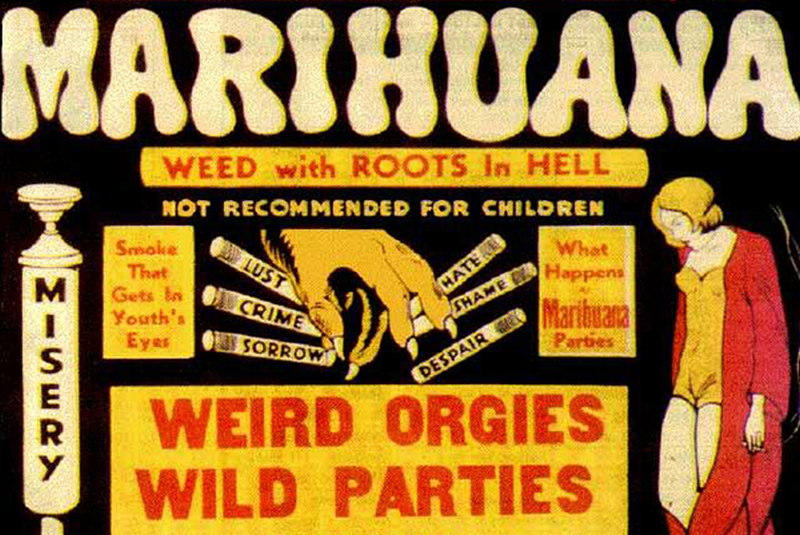An Era of Fear
“Reefer Madness” is a term used to describe the instilled scare and paranoia surrounding the use of cannabis in the early 1900s. This panic was fueled mainly by misinformation and propaganda spread by those who opposed the consumption of cannabis. The term is thought to have originated from a 1936 anti-drug film of the same name. The film was created by Reefer Madness, Inc., a company formed specifically to produce anti-drug films. The film portrays the so-call “dangers” of cannabis use, and claims that it leads consumers to insanity, crime, and even death.
In spite of its complete lack of accuracy, Reefer Madness was hugely successful – it significantly shaped the public’s perception of cannabis and cannabis consumers. It discouraged many people from trying the plant for several years, and some still to this day believe the claims made in the film, despite the overwhelming amount of scientific evidence disproving the claims made in the movie.
The anti-drug sentiment of the “Reefer Madness” era led to the passage of the Marijuana Tax Act in 1937, which criminalized the possession and sale of cannabis in the United States. This law remained in effect until the Supreme Court overturned it in 1969. In the intervening years, there was a significant increase in the use of cannabis and other drugs and a corresponding increase in the level of crime.
President Richard Nixon declared the “War on Drugs” in 1971. It was aimed to reduce drug use and drug related crime through law enforcement and prevention efforts. Despite these efforts, drug use continued to rise throughout the 1970s and 1980s. In response, the government adopted a more punitive approach, enacting mandatory minimum sentences for drug offenses and increasing funding for law enforcement. These pieces of legislation have disproportionately affected Black people and other people of color in the US, leading to higher rates of imprisonment for marginalized communities.
Why Was the Film Hugely Successful?
The film was successful for several reasons:
- It was called “Reefer Madness,” a play on the then-popular term “reefer”, used to describe cannabis.
- The film’s message was that cannabis use leads to insanity, crime, and even death. This message was conveyed through several scenes that showed the main character, Jimmy, committing crimes and acting erratically after smoking cannabis.
- The film was released when there was a lot of fear and hatred surrounding the use of cannabis. It capitalized on the racism prevalent in early 1900s America and was a successful fearmongering tool, as it framed cannabis use as “foreign” and scary.
- Horror films were super popular in the 1930’s, and Reefer Madness was able to take advantage of this by using many of the same techniques that these films used. For example, the film used suspenseful music and shocking scenes to create an atmosphere of fear.
What Impact Did the Film Have?
Reefer Madness had a huge impact on the public’s overall knowledge of cannabis and their ideas about the types of people who consumed it. It was used to discourage people (particularly white, middle class people) from using the drug for decades. The film also helped fuel the fears and anxiety surrounding the use of cannabis.
Reefer Madness has been revived as a cult classic. It is now seen as a humorous example of the propaganda and indoctrination that surrounded the use of cannabis in the early 1900s. Despite its lack of accuracy, Reefer Madness played a significant role in shaping the public’s negative perception of cannabis, and believe it or not, the implications and stigma associated with that are still felt today.
What Were the Intentions Behind Creating this Film?
The people behind the film, Reefer Madness, Inc., were a group of individuals who opposed the use of cannabis. They intended to create a movie that would discourage people from using the plant by creating a deep fear, through lies and hateful racist rhetoric. To this end, they made a film full of misinformation and propaganda that sparked a revolution of anti-cannabis oratory.
Their goal was to scare people into thinking that cannabis use led to a life of delirium, crime, and eventually death. However, the film was so wildly inaccurate that it is often now seen as a comical example of the impact that disinformation and fear-mongering can have in society as a whole.
How Has Reefer Madness Been Received Over Time
Reefer Madness has been received relatively well over time. It is still popular today because it is considered a classic propaganda film. It helps to show how effective fear-mongering and misinformation can be in shaping public opinion. Reefer Madness reminds us that we should be careful about the “information” we consume, and take the time to fact-check before believing everything we hear, see, and read.
Since all upbringings are different, Reefer Madness has had different implications on different people. Some people might find it funny because of how inaccurate it is, while others might find it disturbing because of the message it sent that still echoes through time.
Famous quotes from Reefer Madness
There are a lot of quotes from Reefer Madness that are now famous. Here are some of the most popular ones:
- “And more vicious, more deadly even than these soul-destroying drugs is the menace of marijuana.”
- “The Marijuana Menace is not a thing to be taken lightly… It is not a joke! It is a deadly poison!”
- “Your life is in danger… You’re walking into a trap! If you don’t watch out, marijuana will destroy you! It will wipe you off the face of the earth!”
These quotes show the level of fear-mongering present in the film. They also serve as a reminder of how effective propaganda is in spreading misinformation.
Growing Movement to Legalize Marijuana Use
Despite the negative portrayal of cannabis in Reefer Madness, there was still a growing movement to legalize its use, and the fight for federal legalization is still strong today. Thankfully, many people have realized that the film was full of lies and propaganda and have now broadened their minds into the reality that this plant has done much more good than harm to our society.
Today, cannabis is legal for medicinal and recreational use in many states in the U.S., and is slowly becoming more accepted by the general public. As more research is conducted on the drug, the negative perception of cannabis will hopefully continue to change. However, the fight for federal legalization is still in full swing.
The Future of Marijuana Legalization Remains Uncertain
The future of cannabis legalization remains uncertain. While there is a lot of support for it, there are also many people and politicians who oppose it. The outcome will likely depend on further scientific research and continuing to change public opinion on the issue.
Regardless of what happens in the future, it’s clear that Reefer Madness played a significant role in perpetuating negative views on cannabis, and that it contributed greatly to the slow-moving train towards federal legalization. It may take many years for the negative perception of cannabis to change, but with the continuous work of individuals who have dedicated their lives to bringing the truth to light, we are beginning to see changes slowly happen.
In Conclusion
Reefer Madness is a film created to discourage people from using cannabis. It is full of misinformation and propaganda. In recent years, it has been revived as a cult classic and more of joke than anything else. However, Reefer Madness reminds us that we should be careful about believing everything we are told and to take the time to do our own research before we demonize things we don’t fully understand. For us in the industry, it plays a pillar in just how far we’ve come in the fight for legal cannabis consumption.
Thanks for reading,

Social Share:


